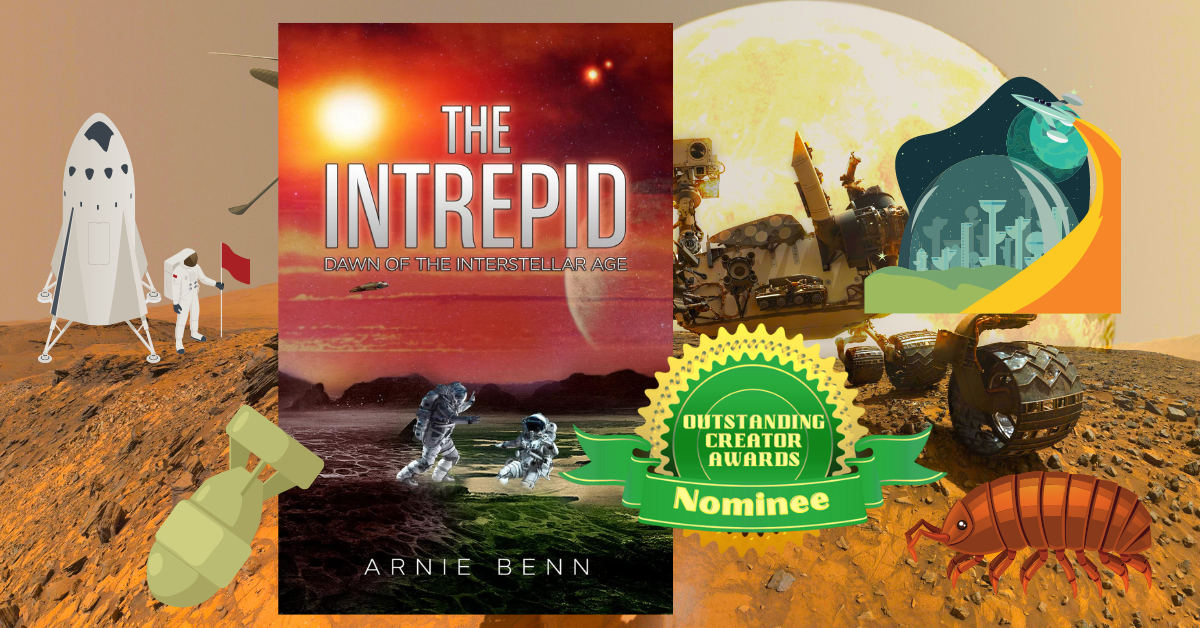|
Score: 93+/100 (9.3+ out of 10)
The Intrepid is a thought-provoking, riveting sci-fi adventure novel that explores space travel and colonization from a realistic lens akin to something like Christopher Nolan's Interstellar. It later successfully incorporates mystery and thriller elements. This is definitely an exceptional book with phenomenal world-building, interesting characters, and what turns out to be a pretty compelling plot. It is an example of a book that turned us around. It sharply changed our opinions of it about a quarter of the way through. The thing is, the first quarter of this book seemed plotless, plodding, and slow with the author choosing to use the first hundred pages to set up characters and explain their space-adventuring, age-defying predicament rather than any particular conflict or advancement in the story. No, advancing in distance crossed isn't necessarily advancing in plot. One thing we immediately noticed about this book (and that really caught us off guard) was that it was written in present-tense. This is extremely rare in our experience with the grand majority of books being written in past-tense. So, it was a bit jarring, but it was also fresh and different. One series we can think of that successfully employed present-tense was the Hunger Game series, but it often requires a writer with the skill of Suzanne Collins and with characters like Katniss Everdeen to pull off. That level of skill and character are far and in between. However, Arnie Benn delivers a valiant and rather impressive effort. The thing about present-tense is that it reads sorta like those case studies in a medical journal article or textbook. For example, “John Doe is a 63-year-old male admitted to the hospital with pounding chest pain...” It has a very scientific, matter-of-fact presentation and feel, which is ironic and perhaps fitting because this is a novel heavily rooted in science and research. It might take a reader a bit to adjust to. This did have two advantages: 1. It contributed to a sense of suspense since events are described as they are happening. This forces the reader to be on their toes. 2. It contributed to differentiating the current events with the flashback sequences (particularly describing the characters before the mission) which are written in past-tense. Once you get used to reading this tense, it's not bad at all. As we said, it works for this particular story because of its themes and genre. The book follows the brave and diverse crews of the Centaurian I and II, spaceships sent to explore a nearby star system (Alpha Centauri) that is said to include at least one Earth-like planet (in the “Goldilocks zone” of the star). Several developments in technology and circumstances on Earth allow for and encourage their interstellar journey, particularly the advent of age-defying and high speed space travel technologies. These characters are allowed to transverse distances that previously were not possible to be traveled in a lifetime. As stated, the situation on the Earth seems to encourage this type of travel. It would seem that the planet experienced catastrophic events about thirty years before the events of the book. We also gathered that attempts had already been made to colonize Mars, which was rendered uninhabitable due to its loss of atmosphere. The United Nations is restructured into an organization known as the WSSA (World Sovereign States Alliance) which prioritizes the colonization of space for the survival of the human species. The crew of the Centaurian I includes Commander Aksel Bolt, Dr. Allison Yarrow, Dr. Joanne Elias, Dr. Lucienda Chen, Jeffrey Rudiger, and Johnny Bang. The crew of the Centaurian II, who assist in their mission, includes Captain Rhymer and our favorite character, Dr. Kioni Kihumba, a geologist. We hate to say this, but this novel really should've been Kihumba's story. Kihumba is our main character of choice. She really stands out because her passion and area of expertise highlight the mystery of extraterrestrial life that persists throughout this book. She also seems to notice and get things about the planet (and the plot) that slip the minds of the other characters despite all of them having apparently gone to college. She completely overshadows characters like Johnny Bang, Chen, and even her own captain. Kihumba has a very precocious, curious personality, one that the reader also hopes to share. Bolt, who comes armed with the second-coolest name ever (after Johnny Bang), finds his arms and legs pulled by all of the other characters. In particularly, Dr. Yarrow seems to have a handle on him. Now, with that said, it isn't like Captain Kirk and Captain Picard weren't challenged during their space-faring tenures. That was a large part of the drama. However, even Bolt seems to get overshadowed in what was probably intended to be his book. In Infernum, the conflict between the leaders and crew of the spaceship was 80% of the intrigue in the story. Like we were saying, the first quarter of this book drags, but it really is worth enduring to get to the heart and meat of the novel. Once the crew finally arrive on the planet and start discovering what they discover, it really picks up. And what they find... will blow your mind! It got us thinking about different mysteries and pseudo-scientific/pseudo-supernatural phenomena like disappearances of ships, planes, and “secret weapons” in places like the Bermuda Triangle. It also challenged things like scientific dogma, the question of whether or not we're alone in the universe, and the Big Bang. However, despite these big, huge subjects, the most charming thing about this book were just the little zoology discoveries like the little trilobite-like creatures that we hoped might become like The Thing. Check it out on Amazon!
0 Comments
Leave a Reply. |
Archives
July 2024
Categories |

 RSS Feed
RSS Feed